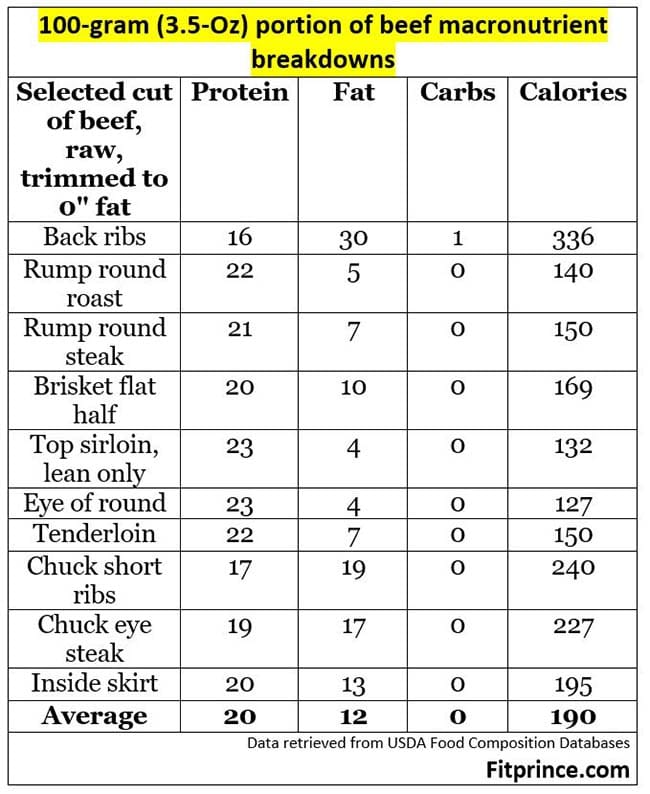Hoe Many Grams of Protein in Beef 100g
Globally, beef is the third most produced meat after poultry and pork. Leading beef consumers live in countries like Uruguay, Argentina, Brazil, and the USA. So, we can conclude that it features regularly on a large number of plates around the globe.
Beef, like other meats, plays an important role in covering our dietary protein requirements.
Hence, it would be useful to know more facts about beef protein in its typical 100-gram (3.5-Oz) serving size.
Beef protein per 100 grams
In fact, it's difficult to get precise numbers about the protein contents in beef because the amount of protein varies among the different cuts. However, I endeavored to collect nutritional data and obtain mean macronutrient values.
On average, beef contains around 20 grams of protein per 100 grams. Together with this protein, it has 12 grams of fat, 0 grams of carbs, and around 190 calories.
The most protein-rich beef cuts are top sirloin and eye of round. Each cut provides an equal amount of protein per 100 grams – 23 grams.
These macronutrient values are only true when you diligently trim extra fat from a particular cut. Otherwise, fat and calorie values will be much higher.
Furthermore, the ingredients you use to prepare the beef will also affect its macronutrient breakdown. For example, you can add a fatty sauce to your dish and the fat number will rise quite drastically.

What about beef alternatives?
If you want to mix things up, you can enjoy veal, buffalo or bison meat as an alternative to beef.
A hundred grams of lean veal sirloin provides 20 grams of protein, 3 grams of fat, 0 grams of carbs, and only 110 calories. Grass-fed bison ground meat has 20 grams of protein, 7 grams of fat, 0 grams of carbs, and 146 calories per 100 grams.
Complete protein
A dietary protein consists of tiny building blocks called amino acids. There are 20 (22) different amino acids of which nine are considered as essential amino acids because our body cannot synthesize them. We can get essential amino acids only from food.
Protein sources, which consist of a sufficient amount of the essential amino acids are termed as a complete protein.
Beef is a complete protein source! It has all of the nine essential amino acids and is a valuable product to cover human body protein needs.
Beef protein powder
Many people who like to exercise or have some kind of allergy prefer to incorporate supplements like protein powder into their eating plan. It helps them easily boost daily protein intake. For many years, the most popular protein powder was whey. Beef protein powders aren't on top of the bestsellers list but they do show a steady demand in some consumer groups.
Depending on the producer, beef protein powder has between 65 and 97 grams of protein per 100 grams or 20 to 30 grams per scoop respectively. Generally, it's three to four times more protein than in real meat!
What about beef protein impact on fitness results?
In 2022 a large-scale study was conducted during which time, researchers analyzed all previously done studies regarding beef protein powder's impact on physical performance and body composition.
After careful data handpicking and comparison, researchers concluded:
1. Whey protein is more readily digestible and has a better essential amino acid profile compared to beef protein powder. However, current data demonstrate that beef protein is just as effective as whey protein powder for exercisers to reach their fitness goals.
2. Red meat contains a lot of iron. Consequently, diet supplementation with beef protein powder could increase the iron level in our body. However, researchers cannot approve this fact and further research is needed. So, if you need to boost your iron levels, preferably choose read meat or specially designed supplements.
Here, I also want you to remind you, that supplements are designed only to fortify your diet, but not as a substitute for real food!
Things to consider before buying beef
I want to share with you a few things to consider before buying beef or choosing it as the main protein source in your diet.
Preferably, choose grass fed beef over grain-fed animals. It has a better nutritional profile e.g. lower fat and higher antioxidant content.
Unfortunately, beef production isn't very environmentally friendly. To produce one kilogram of beef we need to spend more than 15,000 liters of water! By contrast, for one kilogram of apple production, only 1,000 liters is needed. In addition, beef production is also associated with higher greenhouse gas emissions.
Every year over 300 million cattle are slaughtered for meat production.
Recently, there have been many discussions about the possible link between red meat consumption and some types of cancer, like colon cancer.
Despite all the downsides, beef is an excellent source of complete protein, zinc, vitamin B complex, iron, and the physical performance booster creatine.
Reference
Source: https://www.fitprince.com/beef-protein-per-100g/
0 Response to "Hoe Many Grams of Protein in Beef 100g"
Post a Comment